|
|
|
Sort Order |
|
|
|
Items / Page
|
|
|
|
|
|
|
| Srl | Item |
| 1 |
ID:
144741
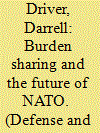

|
|
|
|
|
| Summary/Abstract |
The US role in the North Atlantic Treaty Organization (NATO) Alliance is a 65-year history of retrenchment and renewal. When Washington has sought a retrenchment from the world, it traditionally increased burden sharing pressure on Europe to do more. During times of increased global ambition, the USA reaffirmed its traditional leadership role in the Alliance and its commitment to NATO effectiveness and relevance. This cycle of NATO retrenchment and renewal, however, is halting. Though the USA will continue to go through periods of relative increases and decreases in security policy ambition, signs point to a permanent defense and security retrenchment in Europe. Germany is the ally singularly capable of filling the resulting security gap. If NATO is to avoid the drift toward irrelevance many critics have predicted, Germany will need to cast off old inhibitions toward security and defense leadership. These trends and their implications for NATO's future are explored through historical case studies and the shifting contemporary security environment.
|
|
|
|
|
|
|
|
|
|
|
|
|
|
|
|
| 2 |
ID:
162547
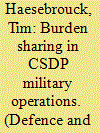

|
|
|
|
|
| Summary/Abstract |
Military burden sharing has been a subject of repeated debates in NATO and the UN. Despite more modest goals, the European Union’s (EU) Common Security and Defense Policy (CSDP) has experienced no fewer difficulties in garnering men, money, and materiel. While this may not come as a surprise, the fact that some EU member states have carried disproportionate shares of the burden of CSDP operations is a puzzle that remains unaccounted for. We address this gap by analyzing determinants of contribution levels to CSDP operations. In employing an innovative multi-method design that combines insights from collection action theory with those from integrated theories of military burden sharing, our results indicate that EU countries tend to contribute in positive disproportion with their capabilities when they have a strong peacekeeping tradition and elections are distant. In contrast, they undercontribute when small trade volumes with the area of operations combine with a weak peacekeeping tradition.
|
|
|
|
|
|
|
|
|
|
|
|
|
|
|
|
| 3 |
ID:
100948
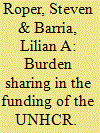

|
|
|
|
|
| Publication |
2010.
|
| Summary/Abstract |
The authors apply the theory of collective action and alliance behavior first developed by Olson and Zeckhauser and later extended by Sandler in a series of studies to test whether the nature of refugee protection influences state motivations to provide contributions. The authors investigate whether refugee protection can be viewed as a pure public good with the concomitant problem of free riding leading to suboptimal outcomes or whether contributions provide states private benefits that transform the nature of the good. Using a Heckman selection model, they test for the determinants of state contributions to the United Nations High Commissioner for Refugees and find that refugee protection offers several private benefits, indicating that it is best understood as an impure public good. They conclude, however, that even when states are able to secure these private benefits, it does not necessarily lead to the optimal provision of refugee protection.
|
|
|
|
|
|
|
|
|
|
|
|
|
|
|
|
| 4 |
ID:
110579
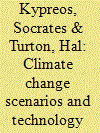

|
|
|
|
|
| Publication |
2011.
|
| Summary/Abstract |
We apply a specific version of MERGE-ETL, an integrated assessment model, to study global climate policies supported by Technology Transfer Protocols (TTPs). We model a specific formulation of such a TTP where donor countries finance via carbon tax revenues, the diffusion of carbon-free technologies in developing countries (DCs) and quantify its benefits. Industrialized countries profit from increased technology exports, global diffusion of advanced technology (leading to additional technology learning and cost reductions) and reduced climate damages through the likelihood of greater global participation in a new international agreement. DCs experience increased welfare from access to subsidized technology, and profit from the reduction of damages related to climate change and expected secondary benefits of carbon abatement (such as reduced local and regional air pollution). The analysis identifies potential candidate technologies that could be supported under a TTP, and the impact of a TTP on economic development (including the flow of transfer subsidies) and global emissions. Although a TTP may encourage additional participation, such a proposal is only likely to be successful if an increased willingness to pay to avoid climate damages is accepted, first by the present and future generations of the industrialized world and later on, when sufficient economic growth is accumulated, by today's developing countries.
|
|
|
|
|
|
|
|
|
|
|
|
|
|
|
|
| 5 |
ID:
119786
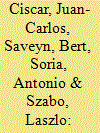

|
|
|
|
|
| Publication |
2013.
|
| Summary/Abstract |
The distribution of the mitigation burden across countries is a key issue regarding the post-2012 global climate policies. This article explores the economic implications of alternative allocation rules, an assessment made in the run-up to the COP15 in Copenhagen (December 2009). We analyse the comparability of the allocations across countries based on four single indicators: GDP per capita, GHG emissions per GDP, GHG emission trends in the recent past, and population growth. The multi-sectoral computable general equilibrium model of the global economy, GEM-E3, is used for that purpose. Further, the article also compares a perfect carbon market without transaction costs with the case of a gradually developing carbon market, i.e. a carbon market with (gradually diminishing) transaction costs.
|
|
|
|
|
|
|
|
|
|
|
|
|
|
|
|
| 6 |
ID:
154334
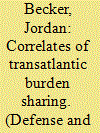

|
|
|
|
|
| Summary/Abstract |
While recent work has attempted to update the research agenda for transatiantic defense burden-sharing, there remain significant gaps between the public choice defense economics literature and the security studies literature. The presence of such a gap is unfortunate, because defense spending choices are likely shaped by factors identified by the public choice literature, as well as the strategic and cultural variables that the security studies literature tends to focus on, as well as domestic macroeconomic factors. The independent variables identified in recent qualitative literature are extremely useful analytically, and, fortunately, they have reasonable proxies in available quantitative data, which enables scholars to study them across large groups of countries and many years. This article builds upon such work to synthesize the most notable of the factors identified in the current literature, and offers some common analytical ground that will benefit both scholars and practitioners..
|
|
|
|
|
|
|
|
|
|
|
|
|
|
|
|
| 7 |
ID:
171712


|
|
|
|
|
| Summary/Abstract |
Resource allocation to and within defense budgets is grand strategy. NATO and the EU coordinate defense planning and encourage fair burden-sharing among their members. We analyze the effect of agreed planning processes, namely the “NATO Defense Planning Process (NDPP)” on the conversion of political will to resources and then to capabilities development across the transatlantic security community. In a “fog of peace” featuring diverse threats, and in which allies may disagree on strategic rivals and sources of risk, national and regional political economies shape strategy, not the other way around.
|
|
|
|
|
|
|
|
|
|
|
|
|
|
|
|
| 8 |
ID:
175311
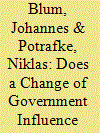

|
|
|
|
|
| Summary/Abstract |
We examine whether changes of government influence compliance with international agreements. We investigate compliance with the NATO two percent target to which all NATO countries committed themselves during the NATO summit in Wales in 2014. The dataset includes the military expenditure by NATO countries over the period 2010–2018. The results suggest that countries that do not (yet) comply with the two percent target have smaller growth rates in military expenditure relative to GDP when they experienced a large change of government, e.g. a change from a rightwing to a leftwing government, than countries that did not experience such a large change of government since the NATO summit in 2014. Countries that experienced a large change of government are, thus, less likely to comply with the two percent target. Future research should examine the credibility problem of national governments in other international agreements too.
|
|
|
|
|
|
|
|
|
|
|
|
|
|
|
|
| 9 |
ID:
163919
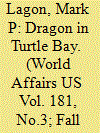

|
|
|
|
|
| Summary/Abstract |
China’s role in the United Nations (UN) is steadily rising at a time the United States is seeking burden-sharing and rethinking its multilateral leadership role. This article highlights that China’s increasing role in three critical areas—(1) UN peacekeeping; (2) the work of the UN on human rights, particularly in the Human Rights Council; and (3) the governance of the digital realm and Internet freedom—has significant implications for U.S. interests and broader global governance efforts. Although China’s transformation into a responsible stakeholder in various areas of the UN’s work could be promising, Beijing’s attempts to alter existing liberal norms bear close examination. Those seeking a larger Chinese role in the UN might best be careful what they wish for. Despite the emergence of populism and some skepticism of multilateral arrangements in their domestic politics, the United States and like-minded nations have an interest in reinforcing liberal norms in these three areas of global governance and beyond.
|
|
|
|
|
|
|
|
|
|
|
|
|
|
|
|
| 10 |
ID:
164655
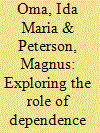

|
|
|
|
|
| Summary/Abstract |
Dependence has been demonstrated to be a main factor driving small states’ alliance contributions. However, the causal pathway linking dependence on the one hand, and small states’ contributions on the other, is seldom explicated and assessed. Furthermore, the ways in which dependence may shape, not only drive, such contributions, have received little attention. The purpose of this article is to elaborate the role of dependence in these regards. Drawing on Glenn H. Snyder’s “fear of abandonment” concept, it is argued that reputation is the main mechanism linking dependence and contributions. The article specifies the causal pathway and assesses it against case-study evidence of Norway’s and Sweden’s military participation in ISAF. The process tracing lends much support to the proposed mechanism, and comparison helps clarify how different alliance relationship status (member or partner) impacts on the theorised causal chain.
|
|
|
|
|
|
|
|
|
|
|
|
|
|
|
|
| 11 |
ID:
191916


|
|
|
|
|
| Summary/Abstract |
How do states distribute the burdens of collective defense? This paper develops a network theory of burden sharing. We focus on bilateral defense cooperation agreements (DCAs), which promote cooperation in a variety of defense, military, and security issue areas. Using a computational model, we show that DCA partners’ defense spending depends on the network structure of their agreements. In bilateral terms, DCAs increase defense spending by committing states to defense activities and allowing partners to reciprocally punish free riding. However, as a state's local network of defense partnerships grows more densely connected, with many transitive “friend of a friend” relations, DCAs have the countervailing effect of reducing defense spending. The more deeply integrated states are in bilateral defense networks, the less they spend on defense. We distinguish two potential mechanisms behind this effect—one based on efficiency improvements, the other on free riding. An empirical analysis using multilevel inferential network models points more to efficiency than to free riding. Defense networks reduce defense spending, and they do so by allowing countries to produce security more efficiently.
|
|
|
|
|
|
|
|
|
|
|
|
|
|
|
|
| 12 |
ID:
182553
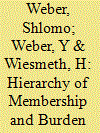

|
|
|
|
|
| Summary/Abstract |
We examine a military alliance with heterogeneous members that finances the production of the ‘alliance good’ (defense, deterrence, and peacekeeping) through its members’ voluntary contributions. To examine the patterns of those contributions, we introduce a decision-making model with three layers of hierarchy: one ‘super-leader’, a group of ‘leaders’, and several ‘followers’, which takes into account different economic and historical backgrounds of member states. The asymmetric interaction between the members is reflected by the choice of Stackelberg paradigm where the sequence of countries’ moves is determined by their alliance status. We then apply Penrose’s Law to incorporate countries’ heterogeneous population sizes in our model and show the existence of a unique Penrose-Stackelberg equilibrium. We apply our results to NATO and offer an empirical evaluation of burden sharing across the alliance by showing how economic characteristics, alliance ‘awareness’, and the alliance status explain the patterns of members’ contributions. We also evaluate the optimal fit between the data and an appropriate choice of the alliance’s hierarchical structure.
|
|
|
|
|
|
|
|
|
|
|
|
|
|
|
|
| 13 |
ID:
175312
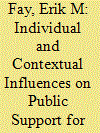

|
|
|
|
|
| Summary/Abstract |
What factors at the individual and country levels influence public support for increased levels of military spending and related foreign policy preferences in NATO countries? Specifically, what individual-level characteristics (e.g., view of NATO) are associated with support for increasing military spending within the NATO alliance, and what country characteristics are associated with shifts in public opinion due to changes in the contextual environment within each country (e.g., military spending/economic growth)? Answers to these questions fill an important gap in the literature by investigating the domestic constraints that influence a country’s response to questions of ‘burden-sharing’ and free riding within NATO. This study examines how citizens’ preferences respond to their domestic political environment, and whether this behavior aligns with the ‘guns versus butter’ trade-off. Findings from a multilevel model combining country-level data with survey data from 13 NATO member countries between 2004–2012 suggest that individuals who view NATO as essential are consistently more likely to support increases in military spending, but changes in the contextual environment, such as high levels of military spending or high levels of economic growth, alter the preferences of individuals in a manner that follows what is known about the trade-offs citizens make between ‘guns versus butter.’
|
|
|
|
|
|
|
|
|
|
|
|
|
|
|
|
| 14 |
ID:
163621
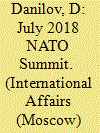

|
|
|
| 15 |
ID:
186521
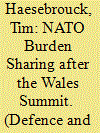

|
|
|
|
|
| Summary/Abstract |
At the 2014 Wales Summit, the NATO allies pledged to spend at least 2% of their GDP on defence by 2024. While some allies are on track to meet the 2% target, others only modestly augmented their military expenditures and still others have even reduced their defence budgets. This article aims to explain the diverging trajectories of the allies’ military expenditures during the first five years after the Wales Summit. More specifically, it introduces an integrated burden sharing model, which is tested with generalized set Qualitative Comparative Analysis. The results of the analysis indicate that the threat posed by Russia provided the most important incentive for increasing defence budgets. However, general budget constraints kept some allies from increasing their defence budget in proportion to the threat posed by Russia. Conversely, in the absence of budget constraints, allies governed by a right-leaning executive made intermediate budget efforts even if they only faced a low level of threat. Strikingly, budget inertia only had a modest impact on the allies’ defence budgets, only resulting in a low level of spending in allies that were not threatened by Russia and either faced considerable budget constraints or were governed by a left-wing government.
|
|
|
|
|
|
|
|
|
|
|
|
|
|
|
|
| 16 |
ID:
156541
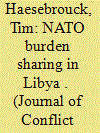

|
|
|
|
|
| Summary/Abstract |
This study aims to explain the pattern of contributions to NATO’s military campaign in Libya. It combines collective action theory with hypotheses on balance of threat, alliance politics, and domestic constraints in a multicausal framework, which is tested with qualitative comparative analysis. The results suggest novel inferences on the interactions between partisan politics, and the benefits states wish to secure by contributing to a multilateral operation. Contrary to conventional wisdom, parties situated at the left of the ideological spectrum were more inclined to support Operation Unified Protector than parties situated at the right. Whereas left-wing governments participated if they had the resources to contribute significantly to the fulfillment of the protection mandate and either highly valued their alliance with the United States or were not facing imminent elections, right-wing governments only contributed if their countries’ interests were threatened by the crisis in Libya or their participation was critical for the operation’s success
|
|
|
|
|
|
|
|
|
|
|
|
|
|
|
|
| 17 |
ID:
185490
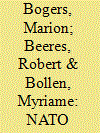

|
|
|
|
|
| Summary/Abstract |
This paper provides both a quantitative and a qualitative review and interpretation of 153 journal papers on NATO burden sharing behaviour published over the period 1966–2020. Based on our findings, we distinguish three paradigms, reflecting the main questions and views within their particular realm of burden sharing research. Subsequently, these three paradigms study (1) the distribution of defence burdens amongst NATO member states; (2) the determinants of NATO burden sharing behaviour; and (3) how contributions to the public good of individual member states merge to determine the overall level of the good available for consumption. For each paradigm, a qualitative insight in evolving bodies of literature is offered. As it turns out, most burden sharing studies are limited to one paradigm and its ensuing main question. Future research may benefit from cross-fertilization across paradigms, longitudinal approaches and a widening of empirical foci to encompass novel threats.
|
|
|
|
|
|
|
|
|
|
|
|
|
|
|
|
| 18 |
ID:
174049
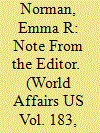

|
|
|
| 19 |
ID:
086555
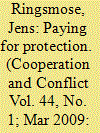

|
|
|
|
|
| Publication |
2009.
|
| Summary/Abstract |
Since the creation of the Atlantic Alliance in 1949, the Alliance's minor partners have persistently spent a smaller share of their Gross Domestic Product (GDP) on military measures than their larger brothers-in-arms do. Taking my cue from collective goods theory, I examine the factors shaping the armament behaviour and military spending patterns of the smaller allies. The article's main theoretical argument is that the smallest among allies tend to perceive their military instruments as the price of admission to a collective defence organization upheld by larger and more potent powers. In essence, military spending becomes the price of security guarantees and protection. Consequently, small allies raise their military expenditures when their security-guaranteeing senior partner threatens with sanctions that the small ally considers more costly than the requested increase in military expenditures and not as a response to rising threats. In the second section of the article, this theoretical claim is illustrated and assessed against Denmark's Cold War defence policies. The empirical findings corroborate the belief that the small allies' leading policy-makers view their armed forces as a necessary evil maintained in order to profit from their senior partners' capabilities.
|
|
|
|
|
|
|
|
|
|
|
|
|
|
|
|
| 20 |
ID:
184233
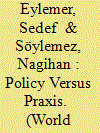

|
|
|
|
|
| Summary/Abstract |
This study analyzes the effects of supranational governance on the refugee crisis in the European Union (EU). The main argument is that the supranational institutions of the EU have often failed to adequately manage the refugee crisis according to its foundational principles of fair burden sharing and solidarity. This failure has gradually discredited the Union’s basic normative principles such as solidarity, hospitality, and respect for human rights. We show that the gaps between certain policies adopted at the Union level and the practices at the national level have widened, and this has led to a familiar defeat of the normative domain by realpolitik, following some central tenets of classical realism. We aim to show that in several areas of EU policy, as well as how individual states have responded to them, national interests and burden shirking, rather than sharing, have unfortunately prevailed.
|
|
|
|
|
|
|
|
|
|
|
|
|
|
|
|
|
|
|
|
|